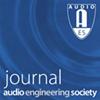关于空间和立体内容的首选耳机响应的差异
IF 1.6
4区 工程技术
Q3 ACOUSTICS
引用次数: 3
摘要
当通过耳机再现空间音频时,确保这些具有平坦的频率响应对于产生准确的渲染非常重要。然而,先前的研究表明,当再现非空间内容(如立体声音乐)时,耳机的响应应该类似于听音室中的扬声器系统(例如,所谓的哈曼目标)。目前还不清楚,一副以这种方式校准的耳机是否也会受到听众的青睐,用于空间音频再现。本研究调查了在立体声和空间音频内容再现的情况下,听众对耳机频率响应的偏好是如何不同的,使用单个双耳房间脉冲响应来呈现。三个听力测试,评估七个不同的目标耳机响应,两个耳机和两个复制带宽,每个测试有超过20个听众。结果表明,在听空间音频内容时,首选平坦耳机响应,而在听立体声内容时,首选哈曼目标。当使用用户特定的均衡时,发现这种效果更强,并且不受耳机或再现带宽选择的显着影响。本文章由计算机程序翻译,如有差异,请以英文原文为准。
On the Differences in Preferred Headphone Response for Spatial and Stereo Content
When reproducing spatial audio over headphones, ensuring that these have a flat frequency response is important to produce an accurate rendering. However, previous studies suggest that, when reproducing nonspatial content such as stereo music, the headphone response should resemble that of a loudspeaker system in a listening room (e.g., the so-called Harman target). It is not yet clear whether a pair of headphones calibrated in such way would be preferred by listeners for spatial audio reproduction too. This study investigates how listeners’ preference regarding headphone frequency response differs in the cases of stereo and spatial audio content reproduction, rendered using individual binaural room impulse responses. Three listening tests that evaluate seven different target headphone responses, two headphones, and two reproduction bandwidths are presented with over 20 listeners per test. Results suggest that a flat headphone response is preferred when listening to spatial audio content, whereas the Harman target was preferred for stereo content. This effect was found to be stronger when user-specific equalization was used and was not significantly affected by the choice of headphone or reproduction bandwidth.
求助全文
通过发布文献求助,成功后即可免费获取论文全文。
去求助
来源期刊

Journal of the Audio Engineering Society
工程技术-工程:综合
CiteScore
3.50
自引率
14.30%
发文量
53
审稿时长
1 months
期刊介绍:
The Journal of the Audio Engineering Society — the official publication of the AES — is the only peer-reviewed journal devoted exclusively to audio technology. Published 10 times each year, it is available to all AES members and subscribers.
The Journal contains state-of-the-art technical papers and engineering reports; feature articles covering timely topics; pre and post reports of AES conventions and other society activities; news from AES sections around the world; Standards and Education Committee work; membership news, patents, new products, and newsworthy developments in the field of audio.
 求助内容:
求助内容: 应助结果提醒方式:
应助结果提醒方式:


